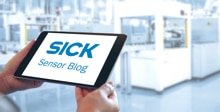Parts of the so-called smart factory are already reality: workstations can coordinate their processes and functions with one another. In other scenarios, production structures are based on autonomous units that organize and optimize themselves independently.
And smart sensors are a prerequisite for implementing Industry 4.0. This is because the smart factory needs data that can principally only be provided by smart, intelligent and communication-enabled sensors. Communication-enabled means being able to exchange sensor data with a machine controller or a cloud-based application. Thus, for example, sensor parameters are automatically adapted to new production orders within seconds. Or a light barrier detects contamination of its optics and reports this directly to the control center.
Sensors ‘best in class’
SICK is currently one of the few suppliers that actually give substance to the term ‘sensor intelligence’. Not for nothing has the promise of ‘Sensor Intelligence.’ been at the core of our brand since 2004. Our smart sensors are the best in their class in detection terms. They also support the communication standard IO-Link, in whose development SICK played a major role. This is the basis. They become smart – and this is our unique selling point – through wide-ranging potentials for self- and process diagnosis, and through integrated logic functions for processing signals directly at the sensor itself.
But what, in concrete terms, does intelligence through diagnostic capabilities and integrated functions mean for use in the smart factory? Smart photoelectric sensors, for example, can detect patterns in an object structure and any changes in them. This takes place directly and autonomously in the sensor – not in the PLC. Machine processes are therefore accelerated; the control program streamlined. This means greater plant efficiency and lower costs for customers. The wide-ranging diagnostic functions of smart sensors can detect critical situations, and correct them, promptly – before the machine undergoes an unplanned downtime. This increases operating reliability, and thus the productivity of the entire plant.
That the addition of intelligence can ‘upgrade’ proven technology to smart sensors can be seen in the case of inductive sensors. Our portfolio includes inductive smart sensors that, for example, detect the distance between the object and the sensor. They can detect when machine processes deviate from the target state and provide a warning in good time, or even make autonomous statements regarding product quality.
Smart sensors for the smart factory
Ultimately consumers also profit from intelligent sensors and dynamic interactive production processes. The key term is ‘batch size 1’: many people are searching for ways to express their individuality. They want to have products that are perfectly adapted to their individual needs. Such true one-offs are either impossible or very expensive using classic production structures. This shows where smart sensors can open up innovation potentials.
Furniture, for example, can nowadays be configured on the internet. Dimensions, design elements, the type of wood and colors can be freely selected, combined, and ordered. The customer order reaches the production system and the machines via the internet. The machines are equipped with intelligent sensors that the controller can parameterize appropriately for the particular product so that the desired piece of furniture can be produced automatically. Production, inspection, packaging and dispatch all take place according to the individual order – and without any manual interventions. The customer receives their personal one-off piece at the price of a mass-produced item.
This, however, is by no means the limit of the potential of smart sensors. Structures that are more autonomous; plants and factories with greater networking; production (and products) that involve more software and IT – all this can already be seen, and makes smart sensors a technology of great future relevance. Flexibility will therefore be in greater demand in future. Industry 4.0 will be created highly individually at our customers’ sites. We will have to be able to react rapidly and precisely to their specific requirements. This will lead to a continuing need for new functionalities in smart sensors.


